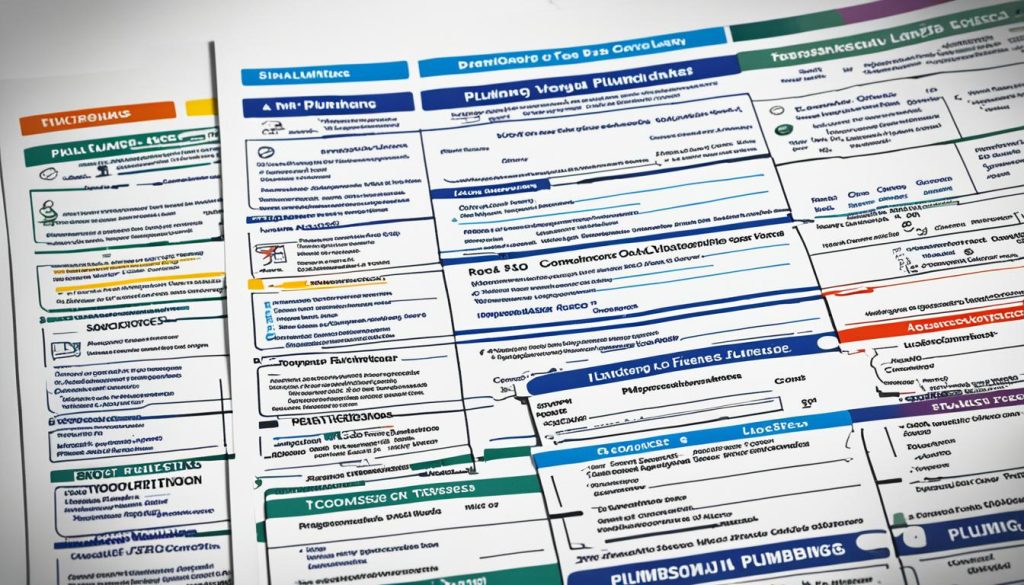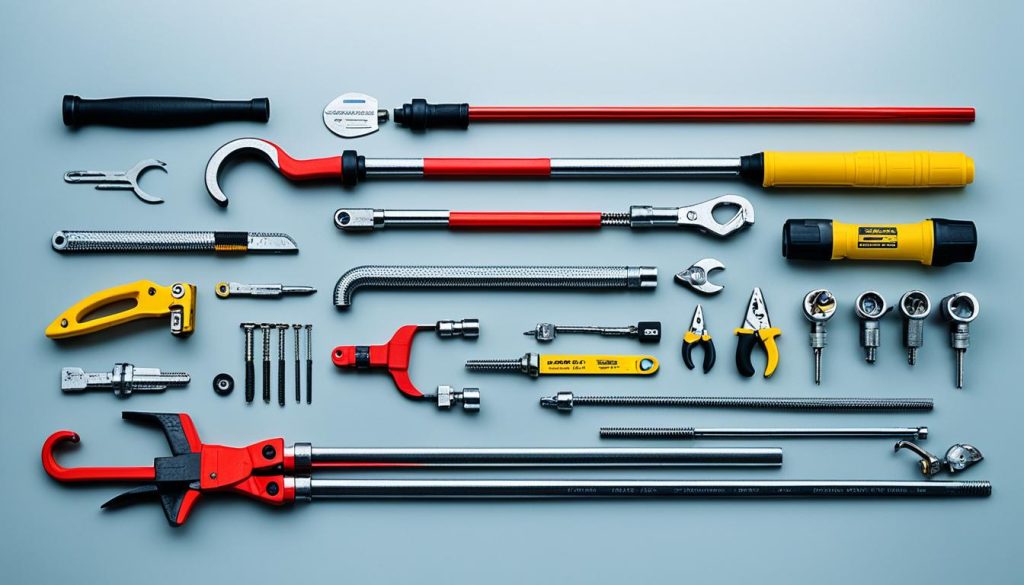Get Your Texas Plumbing License: Easy Guide
Did you know that the demand for skilled plumbers in Texas is projected to grow at a rate of 22%? With such a high demand, now is the perfect time to embark on a journey to get your plumbing license in Texas. Not only will this open up opportunities for higher-paying jobs, but it will also give you the potential to run your own business. However, obtaining a plumbing license in Texas is a multi-step process that requires meeting specific requirements and completing the necessary training and exams.
Let’s dive deeper into the requirements, license types, and steps involved in obtaining a plumbing license in Texas.
Key Takeaways:
- Getting a plumbing license in Texas can lead to higher-paying job opportunities and the ability to start your own business.
- The demand for skilled plumbers in Texas is projected to grow at a rate of 22%.
- Obtaining a plumbing license in Texas involves meeting specific requirements and completing training and exams.
- There are four types of plumbing licenses in Texas: Apprentice Plumber, Tradesman Plumber Limited, Journeyman Plumber, and Master Plumber.
- Each plumbing license has different requirements and allows plumbers to perform specific scopes of work.
Licensing Requirements for Plumbers in Texas
Plumbers in Texas are required to have a license to perform plumbing work. The Texas State Board of Plumbing Examiners is responsible for issuing licenses, endorsements, and registrations. It is illegal to do plumbing work in Texas without a license. To obtain a plumbing license in Texas, you must meet all eligibility requirements, pass an examination, and pay a fee. The licensing requirements ensure that plumbers have the necessary knowledge and skills to perform their work safely and effectively.
Plumbing Regulations in Texas
In Texas, plumbing regulations are enforced by the Texas State Board of Plumbing Examiners. These regulations are in place to protect the health and safety of the public by ensuring that plumbing work is done by qualified professionals. Plumbers are required to adhere to these regulations and must obtain a license to legally perform plumbing work in the state.
Requirements for Plumbing License in Texas
To obtain a plumbing license in Texas, you must meet certain requirements set by the Texas State Board of Plumbing Examiners. These requirements include:
- Minimum age of 18 years
- High school diploma or GED
- Completion of a plumbing apprenticeship program or equivalent experience
- Passing the plumbing license examination
- Payment of required fees
Meeting these requirements demonstrates that you have the necessary knowledge and skills to work as a licensed plumber in Texas.
Texas State Board of Plumbing Examiners
The Texas State Board of Plumbing Examiners is responsible for overseeing the licensing and regulation of plumbers in Texas. They ensure that plumbers meet the necessary qualifications and adhere to the state’s plumbing regulations. The board also handles complaints and disciplinary actions against licensed plumbers who violate the rules and regulations set forth by the board.
It is essential to obtain a plumbing license in Texas to work legally and avoid penalties for performing plumbing work without a license. Being a licensed plumber not only demonstrates your expertise and professionalism but also helps protect the health and safety of the public.
Types of Plumbing Licenses in Texas
There are four types of plumbing licenses in Texas: Apprentice Plumber, Tradesman Plumber Limited, Journeyman Plumber, and Master Plumber. Each license has different requirements and allows plumbers to perform different scopes of work. Let’s take a closer look at each type:
1. Apprentice Plumber
An Apprentice Plumber is an entry-level position where individuals learn and assist with plumbing installations under the supervision of a licensed plumber. It is a great starting point for those looking to enter the plumbing industry and gain hands-on experience.
2. Tradesman Plumber Limited
A Tradesman Plumber Limited license enables plumbers to work on one and two-family dwellings under the supervision of a Responsible Master Plumber. This license allows individuals to take on more responsibilities and work on residential plumbing projects.
3. Journeyman Plumber
A Journeyman Plumber license is the next level in the plumbing licensing hierarchy. Journeyman Plumbers can work on various job sites, take on more complex plumbing projects, and supervise apprentices and Tradesman Plumbers Limited. This license requires a higher level of experience and expertise.
4. Master Plumber
A Master Plumber license is the highest level of licensure in the plumbing industry. Master Plumbers can work on any plumbing job site, handle the most challenging projects, and supervise apprentices and lower-level plumbers. This license is ideal for those who have extensive experience and knowledge in the field.
Additional License: Plumbing Inspector
In addition to the four main licenses, Texas also offers a Plumbing Inspector license. Individuals holding this license are responsible for inspecting plumbing work performed within their jurisdiction, ensuring compliance with plumbing regulations and safety standards.
Each type of license requires different qualifications and may have additional requirements. It’s essential to understand the specific requirements for each license and fulfill them to obtain the desired plumbing license in Texas.
| License | Requirements | Allowable Work |
|---|---|---|
| Apprentice Plumber | No previous experience required | Assist with plumbing installations under supervision |
| Tradesman Plumber Limited | Experience, training course, and exam | Work on one and two-family dwellings under supervision |
| Journeyman Plumber | Experience, training course, and exam | Work on various job sites, supervise apprentices and Tradesman Plumbers Limited |
| Master Plumber | Experience, training course, and exam | Work on any plumbing job site, supervise apprentices and lower-level plumbers |
| Plumbing Inspector | Experience and exam | Inspect plumbing work within jurisdiction |
Each license level provides plumbers with different opportunities and responsibilities. It’s important to choose the license that aligns with your career goals and qualifications.
Steps to Obtain a Plumbing License in Texas
To obtain a plumbing license in Texas, there are specific steps that must be followed for different types of licenses. Whether you are interested in becoming an Apprentice Plumber, Tradesman Plumber Limited, Journeyman Plumber, Master Plumber, or Plumbing Inspector, each license has its own set of requirements and procedures.
Apprentice Plumber License
- Register as an apprentice with the Texas State Board of Plumbing Examiners.
- Pay the required registration fee.
Tradesman Plumber Limited License
- Gain relevant plumbing experience.
- Complete a training course approved by the Texas State Board of Plumbing Examiners.
- Pass the Tradesman Plumber Limited exam.
Journeyman Plumber License
- Acquire the necessary plumbing experience.
- Successfully complete a training course recognized by the Texas State Board of Plumbing Examiners.
- Pass the Journeyman Plumber exam.
Master Plumber License
- Hold a Journeyman Plumber license for a specified number of years (varies by jurisdiction).
- Complete any additional requirements mandated by the Texas State Board of Plumbing Examiners, such as holding a high school diploma or GED.
- Submit the Master Plumber license application along with the required documentation and fees.
Plumbing Inspector License
- Meet the eligibility criteria set by the Texas State Board of Plumbing Examiners for a Plumbing Inspector license.
- Submit the Plumbing Inspector license application along with the required documentation and fees.
It’s important to note that each license application may require additional forms, criminal history information, and fees. Make sure to carefully review the specific requirements for the license you are pursuing to ensure a smooth application process.
Benefits of Getting a Plumbers License in Texas
Getting a plumbing license in Texas brings forth numerous benefits for aspiring plumbers. Licensed plumbers gain access to a wide range of career opportunities across various sectors, including residential, commercial, and industrial settings. This allows licensed plumbers to choose the type of work that aligns with their interests and goals.
One of the most significant benefits of having a plumbing license in Texas is the potential for higher earnings. Licensed plumbers tend to earn more compared to their unlicensed counterparts. With the demand for skilled plumbers on the rise and the shortage of licensed professionals, licensed plumbers have a competitive advantage in the job market, commanding higher wages.
Moreover, a plumbing license provides industry-recognized credentials, enhancing the credibility and reputation of licensed plumbers. Employers value licensed plumbers for their knowledge and skills, giving them a competitive edge over unlicensed individuals when seeking employment opportunities.
Another advantage of being a licensed plumber in Texas is the ability to start your own business. With a plumbing license, you have the opportunity to be your own boss and create your own successful plumbing enterprise. This allows you to have more control over your work, schedule, and financial future.
In summary, obtaining a plumbing license in Texas offers numerous benefits, including increased career opportunities, higher earnings potential, a competitive edge in the job market, the ability to start your own business, and the added credibility of industry-recognized credentials.
Salary Potential for Plumbers in Texas
The salary potential for plumbers in Texas is quite lucrative. According to the U.S. Bureau of Labor Statistics, the annual mean wage for a plumber in Texas is $52,470. This provides plumbers in the Lone Star State with a stable income and ample earning potential.
However, it’s important to note that salary ranges can vary based on several factors such as experience, location, education, and additional certifications. Apprentice plumbers in Texas can expect to earn an average of $17.91 per hour, while journeyman plumbers earn an average of $27.06 per hour. These hourly wages provide a solid foundation for a successful plumbing career.
Having a plumbing license is a key factor in increasing earning potential for plumbers in Texas. Licensed plumbers often have access to higher-paying jobs and opportunities for career advancement. These professionals are in high demand due to the skilled nature of their work, and their expertise is valued by employers and clients alike.
As the demand for skilled plumbers continues to grow in Texas, the salary prospects for licensed plumbers are expected to improve over time. This creates a promising outlook for those considering a career in plumbing.
To provide a clearer picture of the salary potential for plumbers in Texas, here is a table summarizing the average wages at different levels of plumbing expertise:
| Plumber Level | Average Hourly Wage |
|---|---|
| Apprentice | $17.91 |
| Journeyman | $27.06 |
Additional Requirements and Endorsements in Texas
In Texas, there are additional requirements and endorsements available for plumbers beyond the basic licensing requirements. One significant designation is the Responsible Master Plumber (RMP) designation. As an RMP, I have completed a comprehensive training course and obtained commercial liability insurance coverage. This designation demonstrates my commitment to professionalism and ensures that I am well-prepared to handle complex plumbing projects.
Furthermore, there are three endorsements that licensed plumbers can pursue in Texas. The first is the endorsement for Medical Gas Piping. By completing a specialized training course and passing an examination, I am qualified to safely install and maintain medical gas piping systems, which are crucial for healthcare facilities.
The second endorsement is for Residential Fire Protection Sprinkler Systems. With this endorsement, I can design, install, and maintain residential fire protection sprinkler systems, providing homeowners with the peace of mind that comes with state-of-the-art fire safety measures.
Lastly, the endorsement for Rainwater Harvesting Systems allows me to implement sustainable solutions for capturing and utilizing rainwater. This endorsement involves expert knowledge in designing and installing systems that conserve water resources and reduce reliance on traditional water sources.
Source Links
- https://www.servicetitan.com/licensing/plumbing/texas
- https://huckleberry.com/blog/texas-plumber-license/
- https://teamenoch.com/blog/how-to-become-a-licensed-plumber-in-texas/
- Investing Wisely: How Windows & Doors in Boost Property Value and Financial Health - April 24, 2025
- The Financial Impact of Personal Injuries: Why Legal Help Matters for Business Owners - April 16, 2025
- The Hidden Financial Costs of Domestic Assault: What Business Owners Need to Know - April 16, 2025













